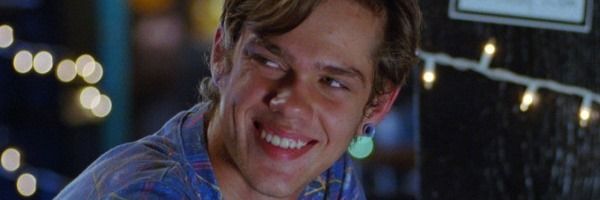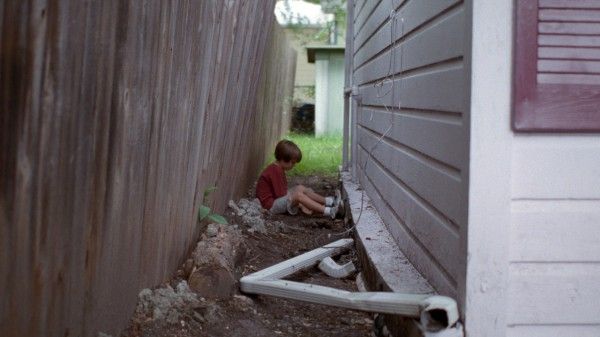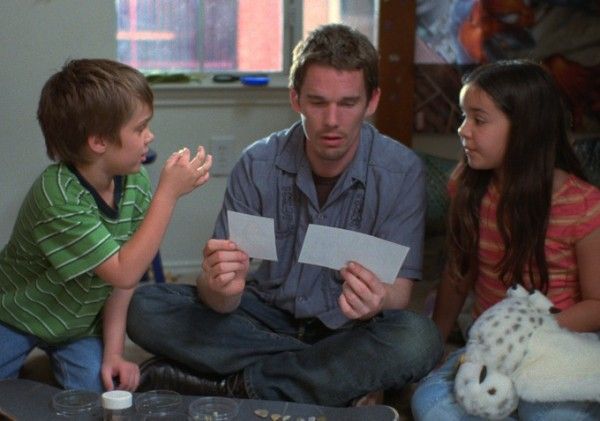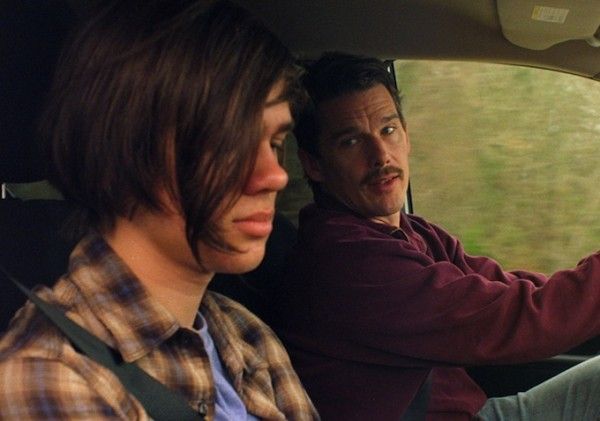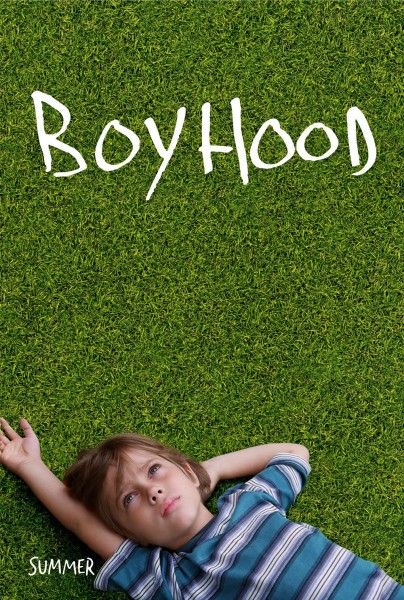From writer/director Richard Linklater, the indie drama Boyhood is a very unique and special project, in that it was filmed over 12 years with the same cast. As you watch Mason (Ellar Coltrane) grow up, from age 6 to age 18, you will see him navigate all aspects of adolescence from road trips and family dinners to birthdays and graduations, and all of the moments in between. The film also stars Ethan Hawke and Patricia Arquette, as Mason’s parents, and Lorelei Linklater, as his sister Samantha.
At the film’s press day, actor Ellar Coltrane spoke to Collider for this exclusive interview about the enormity of this project, what it’s like to share something so intimate with the world, that it feels more like an extension of his emotions and personality than an entirely separate character, when he started to consciously contribute to the process more and more, the experience of watching the finished film for the first time, that he thinks this is something he’ll revisit throughout his life, and how he’d like to continue acting, but also branch out into other aspects of the arts. Check out what he had to say after the jump.
Collider: What’s it like to have this film done and be sharing it with the world and talking about it now?
ELLAR COLTRANE: It’s weird. It’s such an intimate and tender thing. It feels bizarre to sell it. But, I get so much warmth from people. People really appreciate it. It’s all so beautiful.
Watching you grow up over 12 years in the film, do you find that people blur the fact that you’re playing a character?
COLTRANE: Yeah, definitely. People are confused by the differences, or lack of differences between me and the character. I also really appreciate the familiarity that I get from people. It’s nice. It’s beautiful to have people look me in the eyes and actually treat me like a human. And there is so much of myself up on the screen. Even though it is a very crafted character, it’s also a lot of me.
Does it feel very separate from you, or does it feel more like an extension of you?
COLTRANE: It’s very much both. There are parts of my emotions and my personality and my childhood that are both subconsciously and consciously projected on the screen. But then, there’s also this character that I was a very large part of crafted, so there’s also this artistic expression of myself. It’s very interwoven. It’s hard to exactly define where I end and the character begins, or vice versa.
Do you have vivid memories of the beginning of the production, or did you have to watch it to remember the early years?
COLTRANE: Yeah, the early years are foggy, to say the least. It’s kind of vague. I definitely have some memories of those first couple of years, that are mixtures of stories and actual memories that I have. And now, these images from the film are becoming my memories, in a strange way.
Was it strange to watch the finished movie and see yourself doing things that you didn’t remember doing?
COLTRANE: That I had no memory of. Yeah, absolutely. That’s definitely a strange part of watching the film. There are things that this little person did that I know is me, abstractly, but I don’t remember that person and he’s doing things that I don’t remember doing. I recognize myself. The personality of this little 7-year-old, I’m the same person that I was, 12 years ago, more or less. I talk a little more now, but really not that much more. In the same way to see how much you change, it’s incredible to see how little you change. Even with all these experiences you have, that shape you and define your view of the world, you’re still basically the same person. It’s very bizarre.
Was there a year, along the way, where you became aware of the enormity of this project, and when you started to contribute, more and more?
COLTRANE: It was very gradual. I was 11 or 12 when Ethan [Hawke] and I go on the camping trip. That was the first year that I became more of a collaborator on the process, and I became more hands-on and more engaged. But in terms of the scope of this project and its place in the world, and how it relates to other films and will be perceived by other people who watch it, that is not something I ever really thought about when we were making it. I don’t think any of us did. Rick [Linklater] has a lot of stuff in his head, so it’s difficult to say for him, but as far as most of the crew and the cast, we were in the thick of it. It was just happening. It really is just hitting me in these last few months, showing it to people and seeing the reactions. Its impact on the world has dawned on me a lot. But as far as its meaning in my life, that was a very gradual realization.
Do you think anyone will ever try to replicate this process, in some way?
COLTRANE: I hope people try to replicate this because I think Rick achieved something really genuine and tender. It’s a beautiful part of life that a lot of movies gloss over. People have become really jaded and numb to so many things, but it’s just because that’s all we’re given. I don’t want to make any general statements, but I feel like so many stories that are presented as being about humanity and human emotion are just so convoluted and overly dramatic and focus on these certain little things that are supposedly meaningful, but just don’t really mean anything. We didn’t know what to expect with this, but to have people just connect with it and cry with us is incredible. That’s such a beautiful thing. As hard of a time as I’m having with all of this, in doing all of the press, it’s so beautiful to see people have real emotion invoked in them by watching the movie. It’s hard to share it, but that makes it worth it. I’ve struggled so much, growing up, with just feeling that my life is valid because it’s not filled with these hyper-dramatic moments, and I think a lot of people of my generation feel that way. We’re so inundated with hyper-drama that people crave everyday life.
Were there years where you just didn’t want to shoot anymore?
COLTRANE: Not really. Rick was always willing to just let me do what I wanted with it. It’s not like I had free rein, but he was always very open to my input. I’ve always just been really passionate about creating art and being a part of that process because I love it. It was always just a great outlet to just throw myself into. It was therapeutic, growing up.
What was it like to watch the finished film, for the first time?
COLTRANE: It took me a few times to really be able to remove myself from it. It was like I was staring into my own soul, the first couple of times. But I find that I enjoy it and I take more away from it, when I can remove myself from it. It’s not even about Mason, really. Even though it is called Boyhood and it’s through his eyes, that’s not the point. It’s just about life, in general, and the passage of time and the preciousness of everything. In the same way that, in your life, if you’re focusing on yourself too much, you’re missing everything else, it’s the same thing with watching the movie, for me. If I’m just focusing on myself, then I’m missing the rest of the movie. I might be in most of the scenes, but I’m still just one character.
Do you think this is a film that you’ll watch and revisit again, at a later point in your life?
COLTRANE: Yeah, absolutely! I’m sure that I’ll watch it throughout the rest of my life. The way I feel about it now is different than the way I felt about it six months ago, so I can’t even imagine what it will be like in 10 years, when I’m not a teenager anymore. I’m still a child. I’m a little bit more grown up, but I can’t even imagine, when I’m 30, how it’s going to feel to watch. But, every age group seems to connect with it. That’s the amazing thing. It’s very much the story of the parents, too.
How has this experience affected what you want to do? Do you want to keep acting, or do you want to work in another area of the arts?
COLTRANE: I want to make art. That’s what I’ve discovered and what I’ve been realizing recently. The only thing in life that really gives me any peace is just being lost in the process of creating something, whether it’s the film or painting and drawing, which has been a big part of my life, for a long time. Whatever that is, is what I want to do. I definitely enjoy acting, and I hope to have opportunities to keep acting. It’s really just a matter of the right project and the right people. I’m not interested in being famous or anything, but I’m definitely interested in expressing emotions, and acting and filmmaking can be great outlets for that. Filmmaking is not something I’m ready to tackle anytime soon, but it’s an incredible art.
Boyhood is out in theaters on July 11th.

